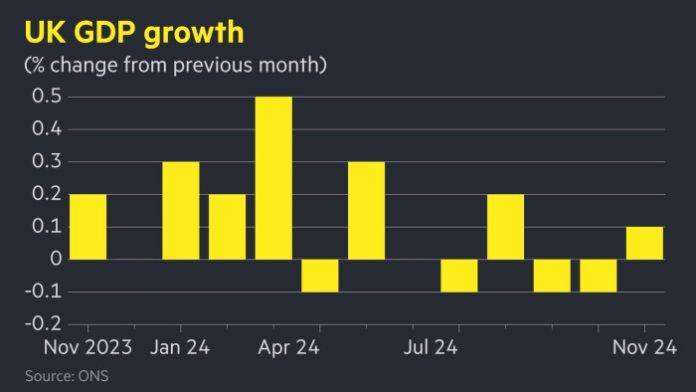Unlock the Editor’s Digest for free
Roula Khalaf, Editor of the FT, selects her favourite stories in this weekly newsletter.
The UK economy grew 0.1 per cent in November, undershooting analysts’ expectations, as chancellor Rachel Reeves comes under increasing pressure to rebuild confidence in the government’s fiscal plans.
The monthly figure was below the 0.2 per cent growth forecast by economists polled by Reuters and follows a 0.1 per cent contraction in both October and September, according to data published on Thursday by the Office for National Statistics.
November’s expansion, the first since August, was led by the dominant services sector, which grew 0.1 per cent and offset a 0.3 per cent contraction in manufacturing. The construction sector grew 0.4 per cent in November following a 0.3 per cent contraction in October.
Thursday’s data will not dispel concerns over the performance of the UK economy after fears of stagflation — sluggish growth is accompanied by persistent price pressures — contributed to a sharp rise in borrowing costs at the start of the year.
“This disappointingly modest return to growth for the UK economy is unlikely to ease stagflation concerns,” said Suren Thiru, economics director at The Institute of Chartered Accountants in England and Wales. “November’s uptick is unlikely to have sparked a more notable improvement in economic activity across the fourth quarter.”
The GDP figures follow official data released on Wednesday showing an unexpected decline in inflation to 2.5 per cent in December from 2.6 per cent the previous month.
In the three months to November, the economy registered no growth compared with the previous three months. Output was also flat in the third quarter, which marked a sharp slowdown from the 0.4 per cent expansion in the previous quarter. Growth was 0.7 per cent between January and March last year.
Experts polled by the Financial Times expected the UK economy to outperform France and Germany, but warned that Reeves’ plans to increase employers’ national insurance contributions could hurt the labour market. The chancellor announced the rise in her October Budget but it will only take effect in April.
Following the release of the data on Thursday, Reeves said: “I am determined to go further and faster to kick-start economic growth, which is the number one priority in our Plan for Change.”
In December, the Bank of England said it expected no growth in the final three months of the year, down from a 0.3 per cent expansion it had forecast in November.
The BoE left interest rates unchanged at 4.75 per cent last month after cutting borrowing costs twice in 2024. Markets largely expect that the bank will cut the policy rate by a quarter-point in February.
Sterling, which has fallen more than 2 per cent against the dollar this year, was little changed $1.221 following the release of the data.
UK government bonds held onto gains from a rally on Wednesday spaked by the inflation data. The 10-year yield was little changed at 4.73 per cent in early trading.
Traders in swaps markets continued to price in at least two quarter-point rate cuts from the Bank of England this year and an 80 per cent chance that the first one comes next month.




